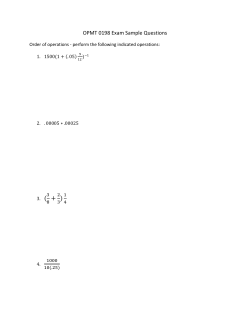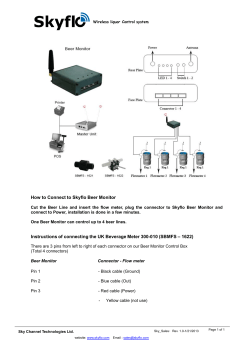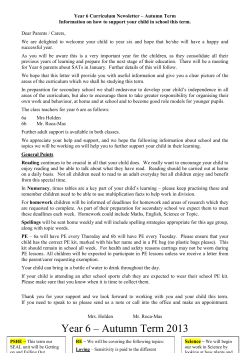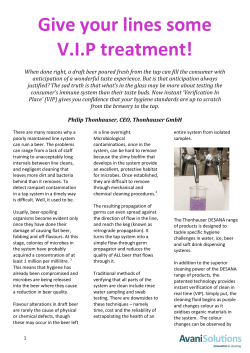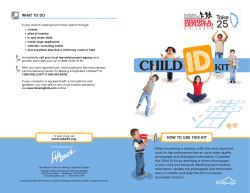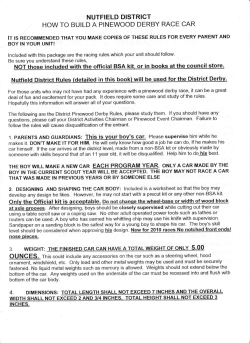
RIDASCREEN® Bacitracin Art. No. R2901
Food & Feed Analysis Juni/2007 II/2014 RIDASCREEN® Bacitracin Art. No. R2901 Bacitracin belongs to the group of polypeptide antibiotics. Through inhibition of cell wall synthesis, it has a broad spectrum bactericidal effect against both gram-positive and gram-negative bacteria. In addition to veterinary application, bacitracin can be used as antimicrobial growth promoter in animal husbandry. Thereby, residues can remain in foodstuff of animal origin and may pose a health risk to consumers. With the new competitive RIDASCREEN® Bacitracin test for quantitative determination of bacitracin in milk, meat, eggs, feed and urine the residues of this antibiotic can be documented. As the maximum residue limits of the European Union and the Russian Customs Union are within the standard range and the detection limits are below these regulatory limits, the test kit allows a sensitive and simple analysis at the same time. The test has no significant cross reactivity to other antibiotics and is therefore highly specific for bacitracin. RIDASCREEN® Bacitracin Art. No. R2901 RIDA® Tetracyclin Spiking Solution Art. No. R3599 R-Biopharm offers a new tetracyclin spiking solution which can be used for validation and fortification experiments in conjunction with the enzyme immunoassay RIDASCREEN® Tetracyclin (Art. No. R3505). The spiking solution kit contains a tetracycline lyophilisate and a buffer for reconstitution. The lyophilisate produces a 10 ml stock of spiking solution with a concentration of 100 ng/ml. The RIDA® Tetracyclin Spiking Solution has a shelf life of 12 months from production date and RIDA® Tetracyclin Spiking Solution Art. No. R3599 the stock solution can be stored up to 6 months at 4 °C after reconstitution. New products Processed assay controls for gluten analysis available: Set of 3 processed Gliadin Assay Controls Art. Nr. R7012 R-Biopharm offers new assay controls for the review of extraction with Cocktail (patented). Until now this review was only possible for the extraction with ethanol, provided by the unprocessed assay controls (Art. No. R7010 – Set of 3 Gliadin Assay Controls). Now the analysis of highly heated (processed) food with the official Codex Alimentarius method (Art. No. R7001 – RIDASCREEN® Gliadin + Cocktail (patented)) can be monitored from the extraction over ELISA procedure and result evaluation. The set of 3 processed gliadin assay controls (Art. No. R7012) consists of an exactly defined highly heated snack, which was produced for an AACCI collaborative trial and therefore it is also very well characterized. The material was newly mixed and will be provided in three different concentrations (5.5 ppm, 20 ppm and 50 ppm prolamin) in this set. These assay controls provide the possibility to establish a quality control card for the review of the whole analytic process. Enzytec™ Glucose Remover Art. No. E3400 The new Glucose Remover kit is especially helpful when testing lactose free samples in conjunction with the Lactose/D-Glucose kit (Art. No. 10986119035). In Germany, this combination is currently being investigated to become mandatory by law. In addition to this, the Glucose Remover kit can be used in every case where a glucose excess must be eliminated. This can be the case when using for example the Sucrose/ D-Glucose (Art. No. 10139041035) or the Sucrose/D-Glucose/D-Fructose (Art. No. 10716260035) assays for the determination of sucrose in honey. The procedure can also be applied for the Maltose/Sucrose/ D-Glucose (Art. No. 11113950035) and the Starch assays (Art. No. 10207748035). All the tests mentioned above do not work properly when the sample contains a large excess of glucose, because the difference between the two cuvettes will be low and not reproducible (Δ A < 0.100). For this reason, the instructions for use of these assays include a special procedure to remove the glucose excess in the sample, by using the enzymes glucose oxidase (GOD) and catalase. The Enzytec™ Glucose Remover (Art. No. E3400) contains the reagents that are needed to apply this procedure on 32 samples. The control sample is a liquid solution. It contains 25 g/l glucose and 1 g/l lactose in order to simulate the concentrations in lactose free milk. It also contains 1 g/l sucrose in order to simulate a honey sample with low sucrose and high glucose concentrations. The control sample is handled like a normal sample where the glucose excess must be removed via the Glucose Remover procedure. For detailed information on the Glucose Remover kit, instructions for use are available from your local distributor. Our products How to ensure gluten-free beer? As summer is coming closer, the days become longer and people stay out to enjoy the extra hours of sun. Who would not like to have a fresh drafted and chilled beer in hand? page 2 For people with celiac disease that imagination is nearly impossible, because gluten, a molecule in high quantity in beer can in this case cause intestinal inflammation. There are just a few beers made from different gluten free cereals or enzymatically treated beers that are an alternative. But, how can one guarantee that these beers are gluten free? For the analysis of gluten in beer different associations like MEBAK (Middle European Brewingtechnological Analysis Commission), the AOECS (Association of European Coeliac Societies), the ASBC (American Society of Brewing Chemists) and the AACCI (American Association of Cereal Chemists International) recommend the RIDASCREEN® Gliadin competitive (Art. No. R7021), because only this ELISA is able to analyze gluten in beer. Gluten proteins in beer are fragmented to peptides due to the brewing process. These peptides cannot be analyzed with a common sandwich ELISA, because the fragments are too small. An analysis of a supposed gluten free beer with a sandwich ELISA may lead to a non-detection of toxic gluten peptides, which may exist in the analyzed beer. The RIDASCREEN® Gliadin competitive (Art. No. R7021) is based on a competitive principle, therefore an analysis of small fragments is possible. Further advantages is the calibrator (standard) row, which consists of fragmented gluten and therefore mirrors the situation in beer, and the use of the R5 antibody recommended by the CODEX Alimentarius as type I method. For these reasons the RIDASCREEN® Gliadin competitive is especially suitable to analyze gluten in beer. Recently in a collaborative study of AACCI it was shown that the RIDASCREEN® Gliadin competitive is a reliable method for the analysis of gluten in fermented or hydrolyzed food or beverages. SureFood® PCR products from our partner CONGEN Biotechnologie GmbH, Berlin News Due to organisational changes, the previous real-time PCR kits for pathogens and microorganisms will be transferred to a new product category, namely SureFast®, and will obtain new order numbers (F instead of S). The composition and properties of the kits remain unchanged. For other real-time PCR parameters (allergens, GMO and animal specification), the well-known brand name SureFood® that was introduced over a decade ago will remain unchanged. Name of the assay SureFast® PREP Campylobacter SureFast® PREP Listeria SureFast® PREP E. coli SureFast® PREP Bacteria I SureFast® PREP Aqua SureFast® PREP DNA/RNA Virus SureCycle - Kit SureCC Color Compensation Kit I Color Compensation Kit for Light Cycler 480 II SureCC Color Compensation Kit II Color Compensation Kit for Light Cycler LC 2.0 SureFast® Inhibition Control SureFast® E. coli eae gene PLUS SureFast® STEC Screening PLUS SureFast® Clostridium botulinum Screening PLUS SureFast® Campylobacter PLUS SureFast® Listeria monocytogenes PLUS Name of the assay SureFast® Cronobacter PLUS SureFast® Staphylococcus aureus PLUS SureFast® Listeria Screening PLUS SureFast® Vibrio Screening PLUS SureFast® Vibrio cholerae PLUS SureFast® Vibrio parahaemolyticus PLUS SureFast® Vibrio vulnificus PLUS SureFast® Clostridium perfringens PLUS SureFast® Bacillus cereus group PLUS SureFast® Legionella pneumophila PLUS SureFast® Legionella Screen PLUS SureFast® Norovirus PLUS SureFast® Norovirus/ Hepatitis A 3plex Old Art. No. S5114 New Art. No. F5114 S5116 F5116 S5117 F5117 S5118 F5118 S5119 F5119 S5120 F5120 S5121 F5121 S5123 F5123 S5126 F5126 S5501 F5501 S5502 F5502 S7001 F7001 S7124 F7124 SureFast® Hepatitis A PLUS S7125 F7125 page 3 Old Art. No. S1008 New Art. No. F1008 S1009 S1013 S1021 S1023 S1051 F1009 F1013 F1021 F1023 F1051 S4001 S4009 F4001 F4009 S4010 F4010 S4050 F4050 S5104 F5104 S5105 F5105 S5110 F5110 S5112 F5112 S5113 F5113 News from our cooperation partner GEN-IAL New: Proof of 27 beer spoiling bacteria in just one reaction Real-time PCR multiplex panel for modern beer analysis First-Beer differentiation PCR Kit Art. No. TPBD 0096 The real-time PCR kits from GEN-IAL GmbH have been tried and tested as group-specific screening kits and individual speciesspecific kits for over a decade. In addition to the advantageous aspect of the open platform – the kits can be used with most of the commercially available qPCR devices and, in turn, are open to other uses – the group wide detection offers the advantage of increasingly recognising new, adaptable beer spoiling bacteria such as the current Lactobacillus parabrevis, therefore making new validations unnecessary. After consultation with several breweries, a new test was developed that, according to current increased requirements, enables screening and detection of the most important beer spoiling bacteria in just one analysis. Pre-coated 8-fold PCR strips each with 3 different parameters can be used on the 96-well block cycler format. The operator uses only 2.5 µl from the sample DNA, inserts this into each of the 8 cavities of one of the strips and adds 17.5 µl of premix. Subsequently, the measurement process can be immediately started. As a consequence, in the 3 detection channels FAM, VIC/HEX and Cy5, a total of 27 parameters are recorded per sample/8th strip (see table). This enables the user to directly identify a variety of beer spoiling bacteria or rather complete relevant groups, with limited handling. In addition to the beer spoiling bacteria, a signal for Enterbacteriaceae would refer to external pollution. 3-channel thermo cyclers such as the Roche LightCycler®480, Bio-Rad CFX96, ABI 7500, or Agilent Mx3005P are required. The openness of this concept enables the user not to have to commit to one system and, furthermore, is easily expandable. Well FAM HEX Cy5 1 L. brevis/brevisimilis/parabrevis L. lindneri L. casei/paracasei 2 L. buchneri/parabuchneri L. collinoides/paracollinoides L. perolens/L. harbinensis 3 L. backii L. rossiae L. acetotolerans 4 L. plantarum/paraplantarum L. coryniformis Internal Amplification Control 5 Pediococcus spp. Ped. damnosus Ped. claussenii 6 Pectinatus spp. Megasphaera spp. Positive Control 7 S. diastaticus Pichia anomala Dekkera spp. 8 Enterobacteriaceae If you are interested in our products, please contact your local distributor. RIDA®SOFT Win / RIDA®SOFT Win.net Art. No. Z9996 Current version: 1.87 page 4 If you are interested in an update of RIDA®SOFT Win or RIDA®SOFT Win.net, please contact your local distributor. Information from R-Biopharm Rhône, Scotland EFSA assess EU limits for deoxynivalenol (DON) in cereals EFSA has recently delivered an opinion on the risks to public health related to a possible increase of the maximum level for deoxynivalenol (DON) in certain semiprocessed cereal products from 750 μg/kg to 1000 μg/kg. Based on modeling different scenarios, it was concluded that an increase of the DON maximum level would increase exposure and consequently exceed the group health based guidance values for this mycotoxin. The EFSA Panel did however see a need for more occurrence data on DON acetyl-derivatives, using sufficiently sensitive methods in order to assess their impact on the health risk associated with an increase of the maximum level for DON. http://www.efsa.europa.eu/en/efsajournal/ pub/3490.htm R-Biopharm DONPREP® immunoaffinity columns offer highly specific clean-up for both DON and 3-acetyl DON for use with LC and LC-MS. The complementary DZT MS-PREP® column offers clean-up to those laboratories wanting to monitor not only DON, but also zearalenone and T-2 / HT-2 toxins fusarium toxins. These columns are widely used in food control enabling official laboratories to meet method performance requirements set out in EU Regulations. R-BiopharmAG Analysis of gluten-free beer Determination of gliadin/gluten in hydrolyzed food with the R5 antibody RIDASCREEN® Gliadin competitive • AACCI38.55.01 • TTBRulingNumber2012-2forbeer • AOECSStandardR5ELISAforhydrolyzedfood • MEBAKMethod2.6.5beeranalysis Related products •ELISA:RIDASCREEN®Gliadin•RIDASCREEN®FASTGliadin•LateralFlow:RIDA®QUICKGliadin •PCR:SureFood®ALLERGENGluten page 5 Fairs and conferences Representative: R-Biopharm AG 07.09. - 10.09.2014 AOAC Annual Meeting Florida, USA 05.10. - 08.10.2014 AACC International Annual Meeting Rhode Island, USA 29.10. - 30.10.2014 Food Analysis Congress Barcelona, Spain Allergen Workshop (LFD, ELISA, PCR) 10/2014 Date: 14.10. -15.10.2014 (optional: intensive qPCR lab training on 16.10.) Time: 14.10.: 10 am - 5 pm / 15.10: 9 am - 5 pm (optional 16.10: 9 am - 2 pm) Location: R-Biopharm AG, Darmstadt, Germany Program: The workshop covers practical work in the lab and presentations by allergen experts. The most used technologies for allergen testing such as LFD (lateral flow testing), ELISA and qPCR will be discussed. The number of participants is limited to 30. Optionally, it is possible to register for an allergen qPCR intensive training on 16.10. (limited to 6 participants). The complete Allergen Workshop will be in English language. Participation Fee: 14.10. - 15.10. 700.00 EUR + 19 % VAT and additionally for the 16.10. 250.00 EUR + 19 % VAT (included: coffee breaks, lunch, hand-outs, material for practical demonstrations, participation certificate, soiree (evening entertainment), 1 overnight stay in the RAMADA Hotel (14.10. - 15.10.), (+ 1 overnight stay for participants of qPCR intensive training (15.10. - 16.10)). At the end of the training all participants will receive a voucher for one allergen test kit (free choice). Information and Registration: Please contact Jasmin Wolf Phone: +49 (0) 61 51 - 81 02-782 or E-mail: j.wolf@r-biopharm.de Vitamin Workshop (HPLC, VitaFast®, ELISA) 10/2014 Date: 28.10. - 30.10.2014 Time: 28.10.: 9:00 - 16.30 h / 29.10.: 9:00 - 16:30 h / 30.10: 9:00 - 15:00 h Location: R-Biopharm Rhône Ltd., Block 10 Todd Campus, West of Scotland Science Park, Acre Road, Glasgow, Scotland Participation Fee: 550.00 EUR + 19 % VAT (training includes coffee breaks, lunch, hand-outs, material for practical demonstrations, participation certificate, soiree (evening entertainment, first two evenings). 3 overnight stays in the Carlton George Hotel ****) Information: R-Biopharm Rhône Ltd. – Marketing department Phone: +44 (0) 141 - 945-2925 or E-mail: info@r-biopharmrhone.com The next R-Biopharmnews will be published in the IIIrd quarter 2014. R-Biopharmnews is edited by R-Biopharm AG An der neuen Bergstraße 17 64297 Darmstadt, Germany Reg.-Nr.: Amtsgericht Darmstadt, HRB 8321 Phone: +49 (0) 61 51 - 81 02-0 Fax: +49 (0) 61 51 - 81 02-40 E-mail: info@r-biopharm.de www.r-biopharm.com
© Copyright 2025
